ESP Citroen GRAND C4 PICASSO RHD 2016 2.G Workshop Manual
[x] Cancel search | Manufacturer: CITROEN, Model Year: 2016, Model line: GRAND C4 PICASSO RHD, Model: Citroen GRAND C4 PICASSO RHD 2016 2.GPages: 523, PDF Size: 13.63 MB
Page 200 of 523
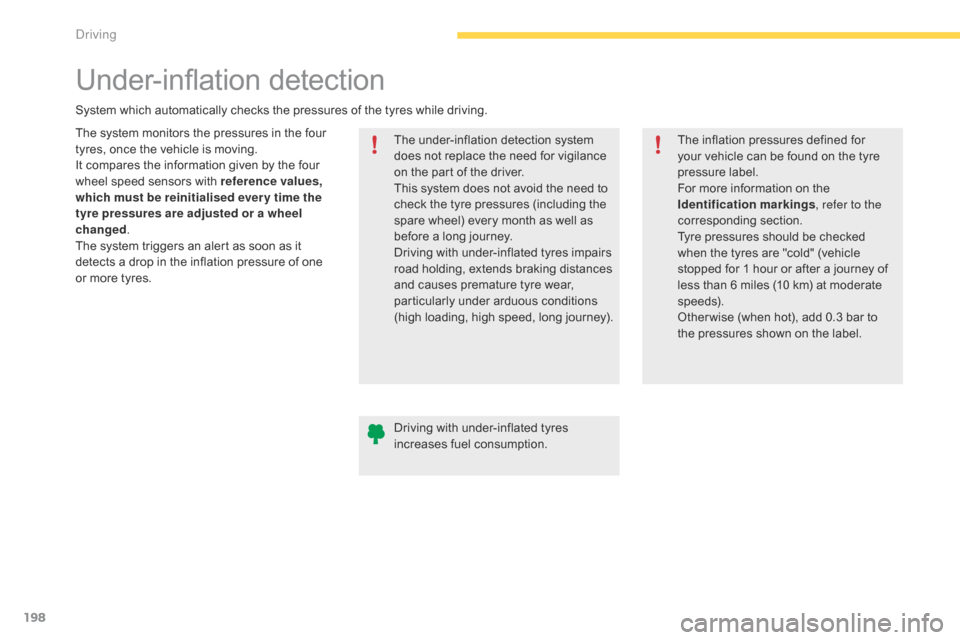
198
Under-inflation detection
The system monitors the pressures in the four t
yres, once the vehicle is moving.
It
compares the information given by the four
w
heel speed sensors with reference values,
which must be reinitialised ever y time the
tyre pressures are adjusted or a wheel
changed .
The
system triggers an alert as soon as it
d
etects a drop in the inflation pressure of one
o
r more tyres. The
under-inflation detection system
d
oes not replace the need for vigilance
o
n the part of the driver.
This
system does not avoid the need to
c
heck the tyre pressures (including the
s
pare wheel) every month as well as
b
efore a long journey.
Driving
with under-inflated tyres impairs
r
oad holding, extends braking distances
a
nd causes premature tyre wear,
p
articularly under arduous conditions
(
high loading, high speed, long journey).
System
which automatically checks the pressures of the tyres while driving.
The inflation pressures defined for
y
our vehicle can be found on the tyre
p
ressure label.
For
more information on the
I
dentification markings, refer to the
corresponding
s
ection.
Tyre
pressures should be checked
w
hen the tyres are "cold" (vehicle
s
topped for 1 hour or after a journey of
l
ess than 6 miles (10 km) at moderate
s
peeds).
Other wise
(when hot), add 0.3 bar to
t
he pressures shown on the label.
Driving
with under-inflated tyres
i
ncreases fuel consumption.
Driving
Page 203 of 523
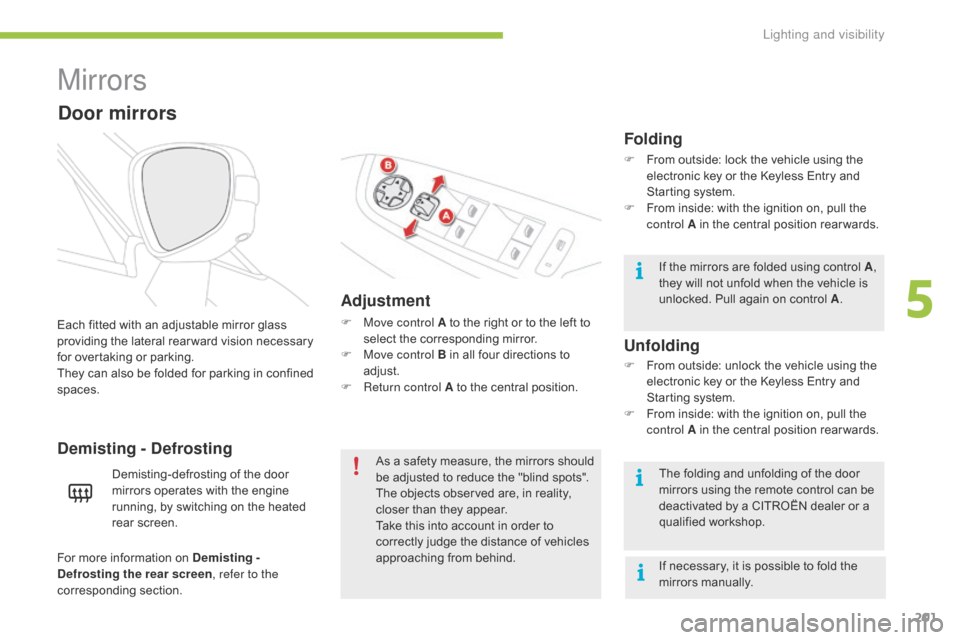
201
Mirrors
Adjustment
F Move control A to the right or to the left to s
elect the corresponding mirror.
F
M
ove control B in all four directions to
adj
ust.
F
R
eturn control A to the central position.
Each
fitted
with
an
adjustable
mirror
glass
p
roviding
the
lateral
rear ward
vision
necessary
f
or
overtaking
or
parking.
They
can
also
be
folded
for
parking
in
confined
spa
ces.
Demisting - Defrosting
Door mirrors
Demisting-defrosting of the door m irrors operates with the engine
r
unning, by switching on the heated
re
ar
sc
reen. As
a safety measure, the mirrors should b
e adjusted to reduce the "blind spots".
The
objects observed are, in reality,
c
loser than they appear.
Take
this into account in order to
c
orrectly judge the distance of vehicles
a
pproaching from behind.
Folding
F From outside: lock the vehicle using the e
lectronic key or the Keyless Entry and
S
tarting system.
F
F
rom inside: with the ignition on, pull the
c
ontrol A in the central position rear wards.
If
the mirrors are folded using control A,
they
will not unfold when the vehicle is
u
nlocked. Pull again on control A.
The
folding and unfolding of the door
m
irrors using the remote control can be
d
eactivated by a CITROËN dealer or a
q
ualified
w
orkshop.
F
F
rom outside: unlock the vehicle using the
e
lectronic key or the Keyless Entry and
S
tarting system.
F
F
rom inside: with the ignition on, pull the
c
ontrol A in the central position rear wards.
Unfolding
If necessary, it is possible to fold the mirrors m anually.
For
more
information
on
Demisting -
Defrosting the rear screen , refer to the
corresponding
s
ection.
5
Lighting and visibility
Page 207 of 523
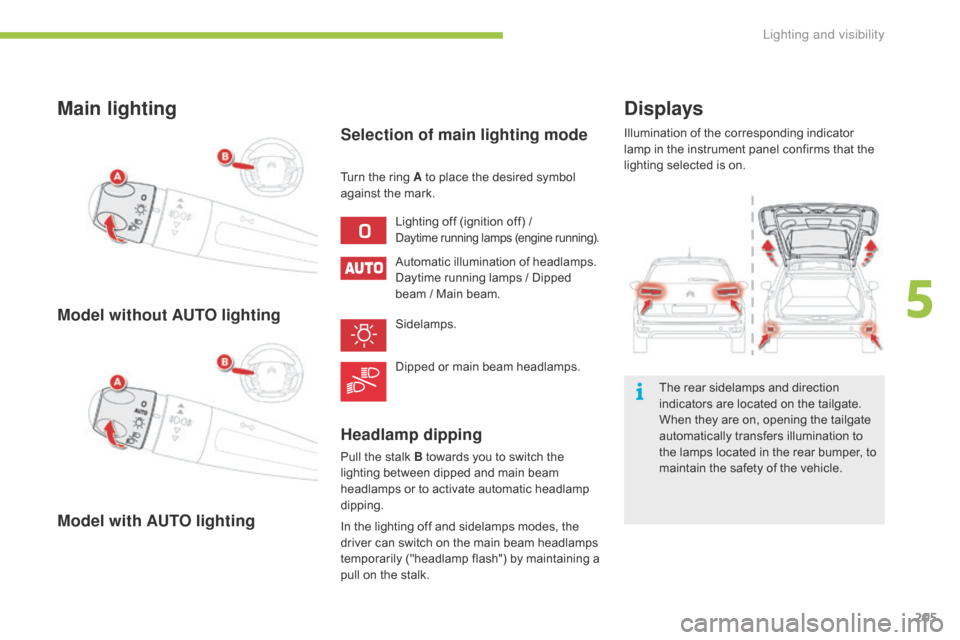
205
Displays
Illumination of the corresponding indicator lamp in the instrument panel confirms that the
l
ighting selected is on.
The
rear sidelamps and direction
i
ndicators are located on the tailgate.
W
hen they are on, opening the tailgate
a
utomatically transfers illumination to
t
he lamps located in the rear bumper, to
m
aintain the safety of the vehicle.
Main lighting
Lighting off (ignition off) /Daytime running lamps (engine running).
Automatic illumination of headlamps.
D aytime running lamps / Dipped
b
eam / Main beam.
Sidelamps.
Dipped
or main beam headlamps.
Turn
the
ring A to place the desired symbol
a
gainst
the mark.
Selection of main lighting mode
Model without AUTO lighting
Model with AUTO lighting Headlamp dipping
Pull the stalk B towards you to switch the l
ighting between dipped and main beam
h
eadlamps or to activate automatic headlamp
d
ipping.
In
the lighting off and sidelamps modes, the
d
river can switch on the main beam headlamps
t
emporarily ("headlamp flash") by maintaining a
p
ull on the stalk.
5
Lighting and visibility
Page 210 of 523
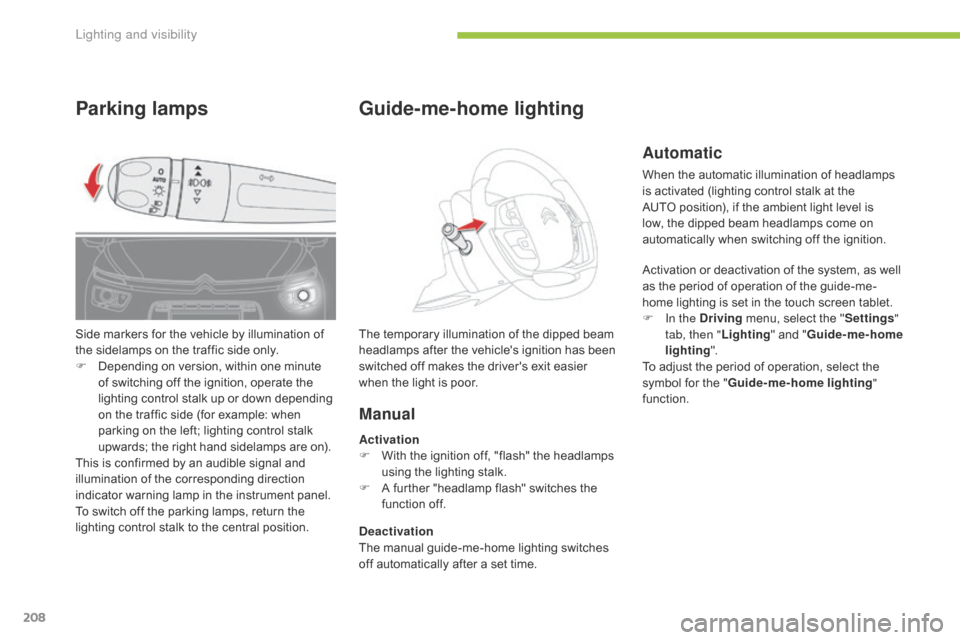
208
Automatic
When the automatic illumination of headlamps is activated (lighting control stalk at the
A
UTO position), if the ambient light level is
l
ow, the dipped beam headlamps come on
a
utomatically when switching off the ignition.
Activation
or deactivation of the system, as well
a
s the period of operation of the guide-me-
home
lighting is set in the touch screen tablet.
F
I
n the Driving
menu, select the "Settings "
tab, then " Lighting"
and "Guide-me-home
lighting ".
To
adjust the period of operation, select the
s
ymbol for the "Guide-me-home lighting "
function.
Parking lamps Guide-me-home lighting
Manual
Deactivation
The
manual guide-me-home lighting switches
o
ff automatically after a set time.
The
temporary illumination of the dipped beam
h
eadlamps after the vehicle's ignition has been
s
witched off makes the driver's exit easier
w
hen the light is poor.
Side
markers
for
the
vehicle
by
illumination
of
t
he
sidelamps
on
the
traffic
side
only.
F
D
epending
on
version,
within
one
minute
o
f
switching
off
the
ignition,
operate
the
l
ighting
control
stalk
up
or
down
depending
o
n
the
traffic
side
(for
example:
when
p
arking
on
the
left;
lighting
control
stalk
u
pwards;
the
right
hand
sidelamps
are
on).
This
is
confirmed
by
an
audible
signal
and
i
llumination
of
the
corresponding
direction
i
ndicator
warning
lamp
in
the
instrument
panel.
To
switch
off
the
parking
lamps,
return
the
l
ighting
control
stalk
to
the
central
position. Activation
F
W
ith the ignition off, "flash" the headlamps
u
sing the lighting stalk.
F
A
further "headlamp flash" switches the
f
unction off.
Lighting and visibility
Page 212 of 523
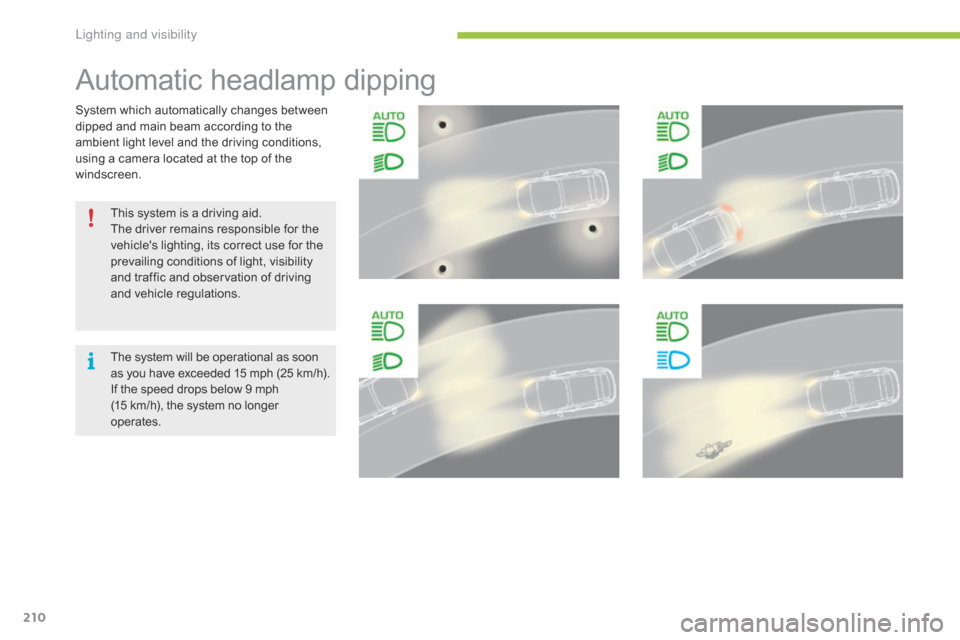
210
System which automatically changes between dipped and main beam according to the
a
mbient light level and the driving conditions,
u
sing a camera located at the top of the
w
indscreen. This
system is a driving aid.
The
driver remains responsible for the
v
ehicle's lighting, its correct use for the
p
revailing conditions of light, visibility
a
nd traffic and observation of driving
a
nd vehicle regulations.
The
system will be operational as soon
a
s
you
have
exceeded
15
mph
(25 km/h).
If
the speed drops below 9 mph
(
15 km/h), the system no longer
ope
rates.
Automatic headlamp dipping
L
Page 216 of 523
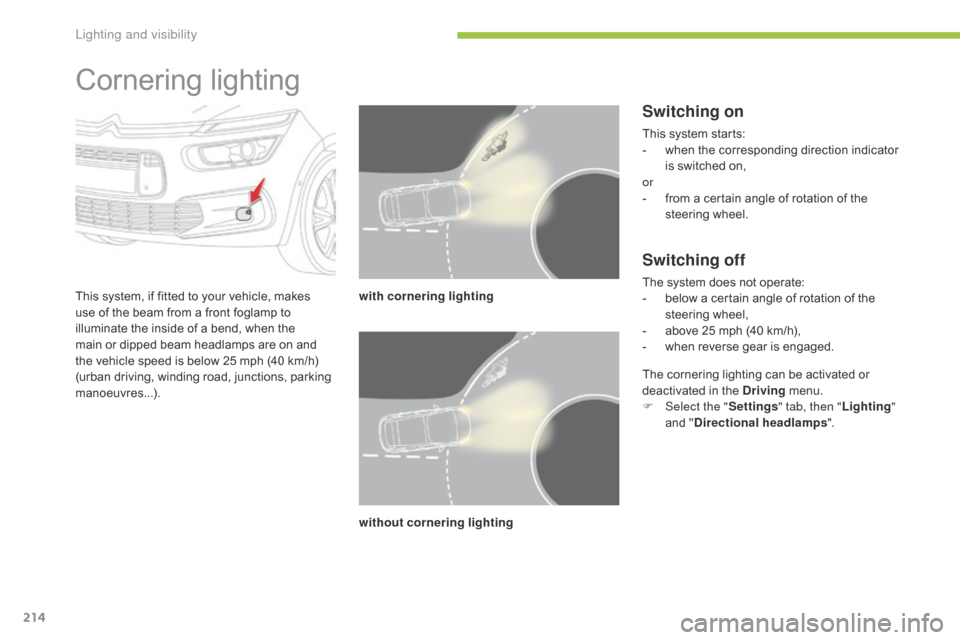
214
Cornering lighting
This system, if fitted to your vehicle, makes use of the beam from a front foglamp to
i
lluminate the inside of a bend, when the
m
ain or dipped beam headlamps are on and
t
he vehicle speed is below 25 mph (40 km/h)
(
urban driving, winding road, junctions, parking
m
anoeuvres...). with cornering lighting
without cornering lighting
Switching on
This system starts:
- w hen the corresponding direction indicator
i
s switched on,
or
-
f
rom a certain angle of rotation of the
s
teering
w
heel.
Switching off
The system does not operate:
- b elow a certain angle of rotation of the
s
teering
w
heel,
-
a
bove 25 mph (40 km/h),
-
w
hen reverse gear is engaged.
The
cornering lighting can be activated or
d
eactivated in the Driving
menu.
F
Sel
ect the " Settings " tab, then " Lighting"
and
"Directional headlamps ".
Lighting and visibility
Page 231 of 523
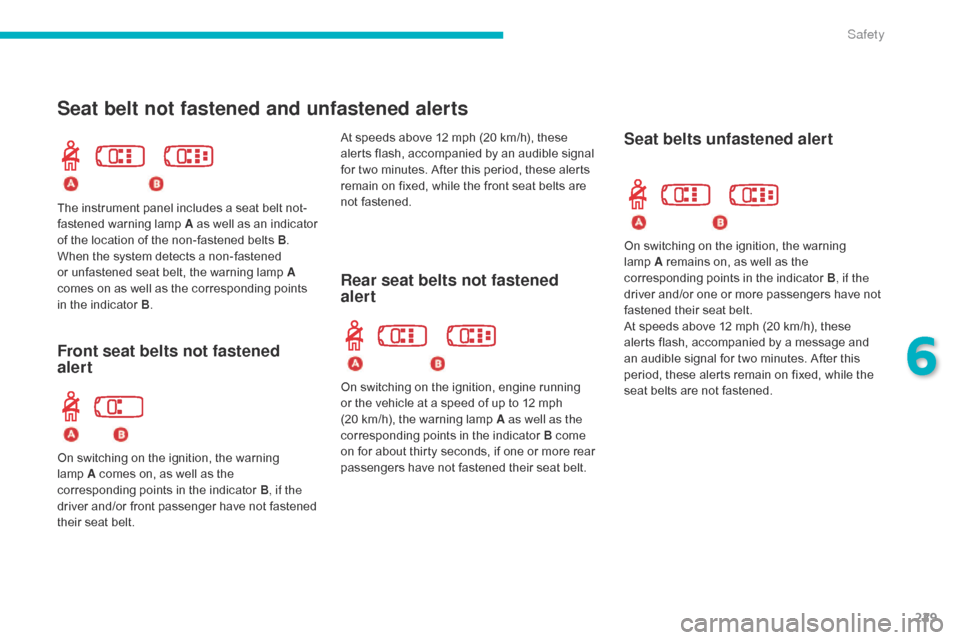
229
Seat belt not fastened and unfastened alerts
Rear seat belts not fastened
alert
The instrument panel includes a seat belt not-
f astened w arning lam p A as well as an indicator o
f the location of the non-fastened belts B.
When
the system detects a non-fastened
o
r unfastened seat belt, the warning lamp A
comes
on as well as the corresponding points
i
n the indicator B.
On
switching on the ignition, engine running
o
r the vehicle at a speed of up to 12 mph
(
20 km/h), the warning lamp A as well as the
corresponding
points in the indicator B come
o
n for about thirty seconds, if one or more rear
p
assengers have not fastened their seat belt.
Seat belts unfastened alert
Front seat belts not fastened
alert
On switching on the ignition, the warning lam p A comes on, as well as the
c
orresponding points in the indicator B, if the
driver
and/or front passenger have not fastened
t
heir seat belt. At
speeds above 12 mph (20 km/h), these
a
lerts flash, accompanied by an audible signal
f
or two minutes. After this period, these alerts
r
emain on fixed, while the front seat belts are
n
ot fastened.
On switching on the ignition, the warning
lam
p
A
remains on, as well as the
c
orresponding points in the indicator B
, if the
driver and/or one or more passengers have not
f
astened their seat belt.
At speeds above 12 mph (20 km/h), these
a
lerts flash, accompanied by a message and
a
n audible signal for two minutes. After this
p
eriod, these alerts remain on fixed, while the
s
eat belts are not fastened.
6
Safety
Page 232 of 523
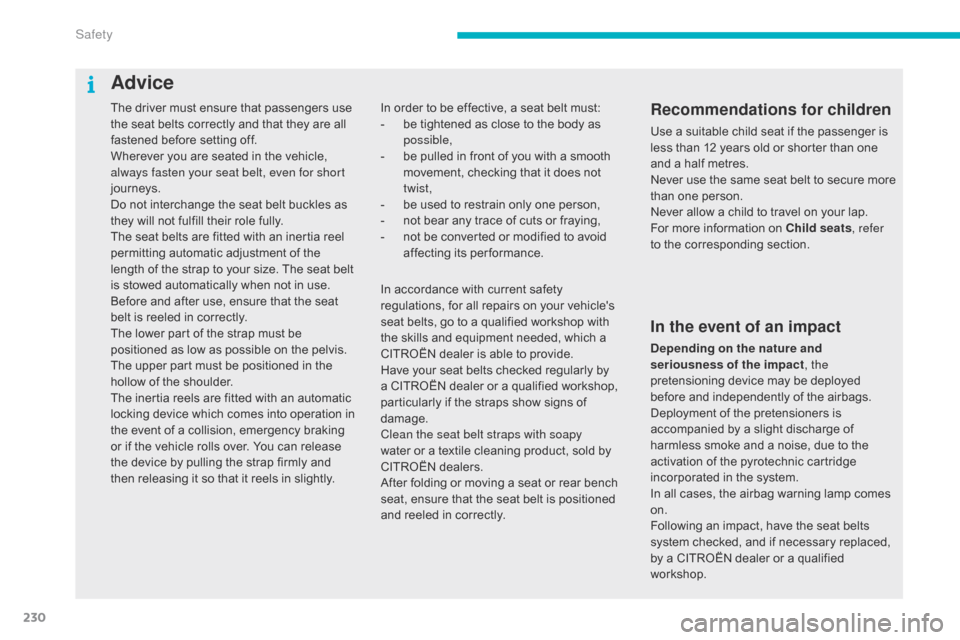
230
The driver must ensure that passengers use the seat belts correctly and that they are all
f
astened before setting off.
Wherever
you are seated in the vehicle,
a
lways fasten your seat belt, even for short
journeys.
Do
not interchange the seat belt buckles as
t
hey will not fulfill their role fully.
The
seat belts are fitted with an inertia reel
p
ermitting automatic adjustment of the
l
ength of the strap to your size. The seat belt
i
s stowed automatically when not in use.
Before
and after use, ensure that the seat
b
elt is reeled in correctly.
The
lower part of the strap must be
p
ositioned as low as possible on the pelvis.
The
upper part must be positioned in the
h
ollow of the shoulder.
The
inertia reels are fitted with an automatic
l
ocking device which comes into operation in
t
he event of a collision, emergency braking
o
r if the vehicle rolls over. You can release
t
he device by pulling the strap firmly and
t
hen releasing it so that it reels in slightly.Recommendations for children
Use a suitable child seat if the passenger is less than 12 years old or shorter than one
a
nd a half metres.
Never
use the same seat belt to secure more
t
han one person.
Never
allow a child to travel on your lap.
For
more information on Child seats, refer
to
the corresponding section.
In
order
to
be
effective,
a
seat
belt
must:
-
b
e
tightened
as
close
to
the
body
as
p
ossible,
-
b
e
pulled
in
front
of
you
with
a
smooth
m
ovement,
checking
that
it
does
not
t
wist,
-
b
e
used
to
restrain
only
one
person,
-
n
ot
bear
any
trace
of
cuts
or
fraying,
-
n
ot
be
converted
or
modified
to
avoid
a
ffecting
it
s
p
erformance.
In the event of an impact
Depending on the nature and
seriousness of the impact , the
pretensioning
device may be deployed
b
efore and independently of the airbags.
D
eployment of the pretensioners is
a
ccompanied by a slight discharge of
h
armless smoke and a noise, due to the
a
ctivation of the pyrotechnic cartridge
i
ncorporated in the system.
In
all cases, the airbag warning lamp comes
o
n.
Following
an impact, have the seat belts
s
ystem checked, and if necessary replaced,
b
y a CITROËN dealer or a qualified
w
orkshop.
In
accordance
with
current
safety
r
egulations,
for
all
repairs
on
your
vehicle's
s
eat
belts,
go
to
a
qualified
workshop
with
t
he
skills
and
equipment
needed,
which
a
C
ITROËN
dealer
is
able
to
provide.
Have
your
seat
belts
checked
regularly
by
a
CITROËN
dealer
or
a
qualified
workshop,
p
articularly
if
the
straps
show
signs
of
d
amage.
Clean the seat belt straps with soapy
water
or
a
textile
cleaning
product,
sold
by
C
ITROËN
dealers.
After
folding
or
moving
a
seat
or
rear
bench
s
eat,
ensure
that
the
seat
belt
is
positioned
a
nd
reeled
in
correctly.
Advice
Safety
Page 235 of 523
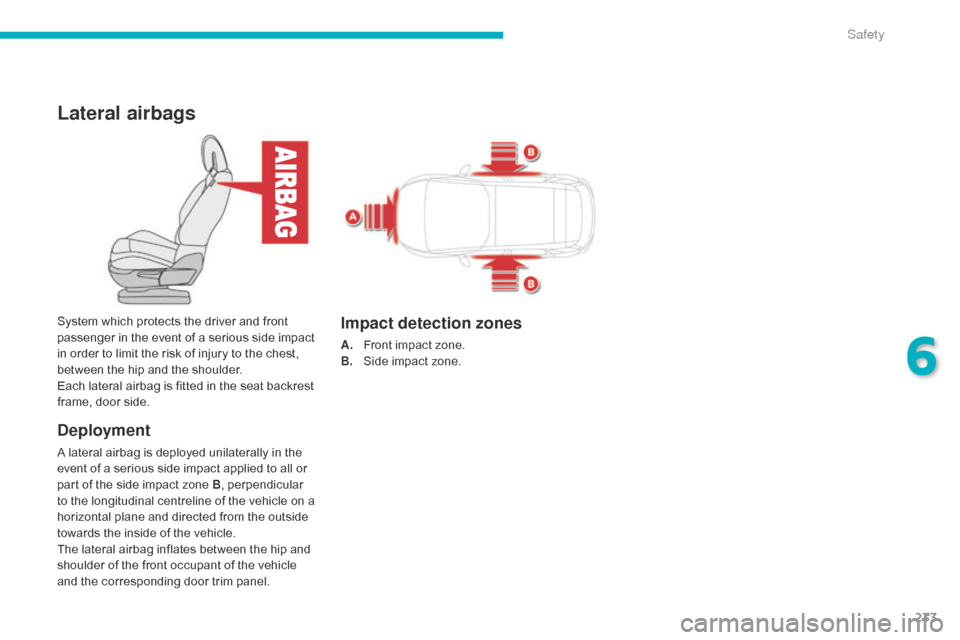
233
Lateral airbags
Deployment
A lateral airbag is deployed unilaterally in the event of a serious side impact applied to all or
p
art of the side impact zone B, perpendicular
t
o the longitudinal centreline of the vehicle on a
h
orizontal plane and directed from the outside
t
owards the inside of the vehicle.
The
lateral airbag inflates between the hip and
s
houlder of the front occupant of the vehicle
a
nd the corresponding door trim panel.
System
which protects the driver and front
p
assenger in the event of a serious side impact
i
n order to limit the risk of injury to the chest,
b
etween the hip and the shoulder.
Each lateral airbag is fitted in the seat backrest
f
rame, door side.
Impact detection zones
A. Front
impact zone.
B. S ide impact zone.
6
Safety
Page 236 of 523
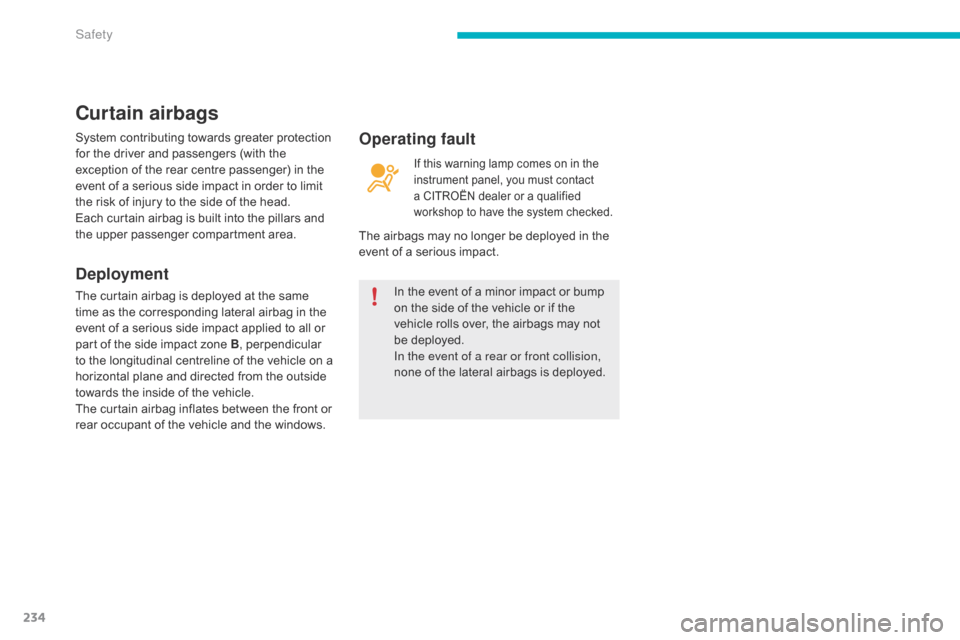
234
In the event of a minor impact or bump on the side of the vehicle or if the
v
ehicle rolls over, the airbags may not
b
e deployed.
In the event of a rear or front collision,
none
of the lateral airbags is deployed.
System
contributing
towards
greater
protection
f
or
the
driver
and
passengers
(with
the
e
xception
of
the
rear
centre
passenger)
in
the
e
vent
of
a
serious
side
impact
in
order
to
limit
t
he
risk
of
injury
to
the
side
of
the
head.
Each
curtain
airbag
is
built
into
the
pillars
and
t
he
upper
passenger
compartment
area.
Curtain airbags
Deployment
The curtain airbag is deployed at the same t
ime as the corresponding lateral airbag in the
e
vent of a serious side impact applied to all or
p
art of the side impact zone B, perpendicular
t
o the longitudinal centreline of the vehicle on a
h
orizontal plane and directed from the outside
t
owards the inside of the vehicle.
The
curtain airbag inflates between the front or
r
ear occupant of the vehicle and the windows.
If this warning lamp comes on in the instrument panel, you must contact
a
CITROËN dealer or a qualified
w
orkshop to have the system checked.
Operating fault
The airbags may no longer be deployed in the event of a serious impact.
Safety